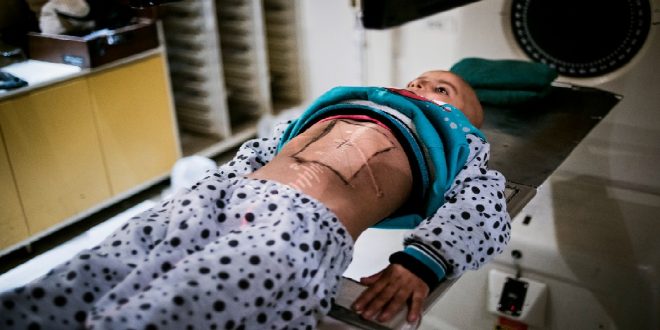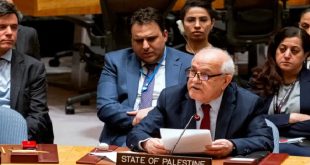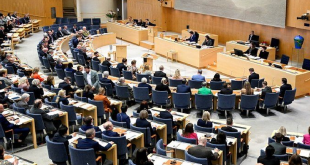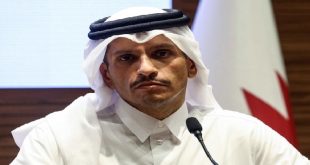03-03-2023
DAMASCUS/ IDLIB: Lying on his hospital bed in a room full of other patients, Mustafa Eid looks from the intravenous solution entering his body, seemingly counting the drops, to the people around him, each with a needle in their arm delivering the medicines hanging next to them.
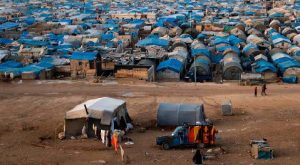 Eid, from Ariha south of Idlib, is at the Hematology and Oncology Centre in Idlib, receiving his seventh dose of an advanced cancer treatment he is undergoing.
Eid, from Ariha south of Idlib, is at the Hematology and Oncology Centre in Idlib, receiving his seventh dose of an advanced cancer treatment he is undergoing.
His first six doses were in Turkey, but after the massive earthquakes that hit southern Turkey and northern Syria on February 6, he says: “I heard that cancer patients were being stopped from entering Turkey to receive treatment there… I felt as if my death was near.”
Treatment in Turkey had been free, but this one dose cost the father of seven about $350, and it is worrying him a great deal.
“Today, I took the first dose that some friends and relatives bought for me, but I do not know what I will do after that because my treatment is long and very expensive,” Eid told media.
The Haematology and Oncology Centre in Idlib Central Hospital, supported by the Syrian American Medical Society, is the only centre in Idlib providing free treatment for cancer patients.
The centre is overworked; it turns nobody away and struggles to treat them in spite of an acute shortage of 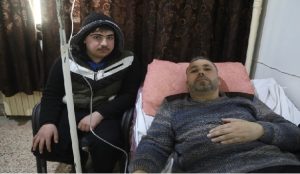 chemotherapy drugs, some of which are entirely unavailable in the centre’s pharmacy, and a lack of radiotherapy facilities. For some drugs that it does not have, the Centre has to ask patients to procure them externally so they can administer them.
chemotherapy drugs, some of which are entirely unavailable in the centre’s pharmacy, and a lack of radiotherapy facilities. For some drugs that it does not have, the Centre has to ask patients to procure them externally so they can administer them.
The burden on the centre has increased since Turkish authorities closed the borders after the earthquake, leaving some of these patients on the Syrian side with nowhere else to turn.
“Before the earthquake, our centre received about 2,000 patients a month, and about 500 doses were administered a month but after the earthquake, more than 50 patients returned from Turkey and received doses in our centre,” said Dr Ayham Jamo, head of hematology and oncology at Idlib Central Hospital.
The shortage of medicine and the sometimes exorbitant cost required to secure it elsewhere have become an obsession with many patients whose treatment schedules are essential for their recovery.
Hasna al-Obeid, 52 years old, from Sheikh Bahr town in rural Idlib, came to the centre to complete her breast cancer 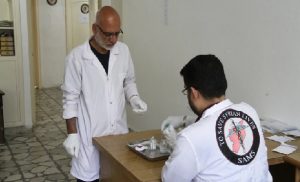 treatment, which she had started in Antakya, Turkey. When the earthquake destroyed the hospital where she was being treated, she headed back to Syria to see what her options were there.
treatment, which she had started in Antakya, Turkey. When the earthquake destroyed the hospital where she was being treated, she headed back to Syria to see what her options were there.
Most of the treatment required is for newborns, heart diseases, and cancer patients, in addition to emergency cases.
According to Bab al-Hawa crossing, during the past year, approximately 1,264 patients were transferred to receive treatment in Turkish hospitals, while the number of cancer patients last January reached 149.
“Those most affected by the decision of closing the crossing are cancer patients who need emergency intervention for their treatment, especially since the time factor is very important for their treatment,” said Dr Bashir Ismail, director of the medical documentation office at Bab al-Hawa crossing.
Sources in the Turkish interior ministry told Al Jazeera that transfers were being allowed for emergency cases. (Int’l Monitoring Desk)
 Pressmediaofindia
Pressmediaofindia
